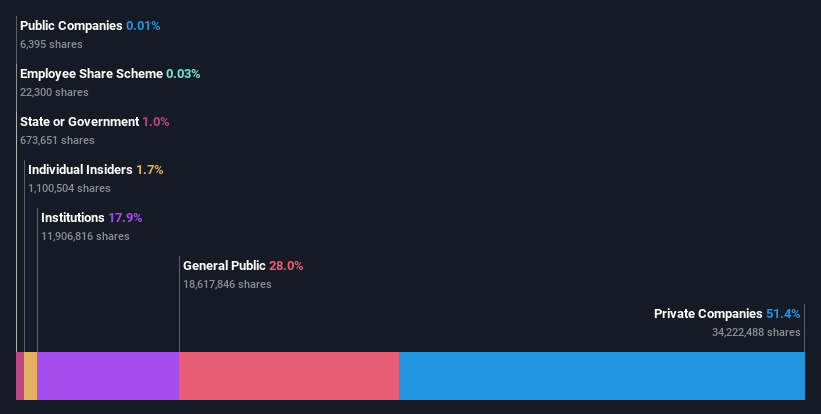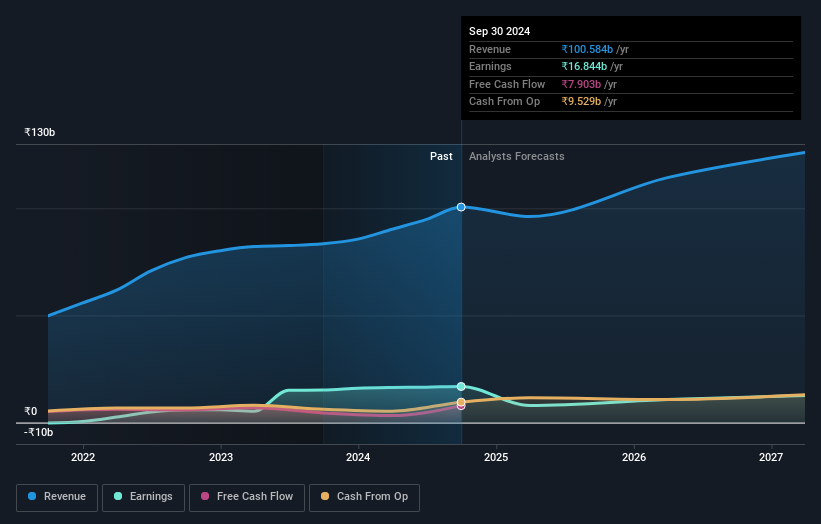Private companies in Raymond Limited (NSE:RAYMOND) are its biggest bettors, and their bets paid off as stock gained 12% last week
Key Insights
- Significant control over Raymond by private companies implies that the general public has more power to influence management and governance-related decisions
- A total of 3 investors have a majority stake in the company with 52% ownership
- Institutional ownership in Raymond is 18%
A look at the shareholders of Raymond Limited (NSE:RAYMOND) can tell us which group is most powerful. And the group that holds the biggest piece of the pie are private companies with 51% ownership. That is, the group stands to benefit the most if the stock rises (or lose the most if there is a downturn).
As a result, private companies collectively scored the highest last week as the company hit ₹120b market cap following a 12% gain in the stock.
Let's delve deeper into each type of owner of Raymond, beginning with the chart below.
See our latest analysis for Raymond

What Does The Institutional Ownership Tell Us About Raymond?
Institutional investors commonly compare their own returns to the returns of a commonly followed index. So they generally do consider buying larger companies that are included in the relevant benchmark index.
We can see that Raymond does have institutional investors; and they hold a good portion of the company's stock. This implies the analysts working for those institutions have looked at the stock and they like it. But just like anyone else, they could be wrong. When multiple institutions own a stock, there's always a risk that they are in a 'crowded trade'. When such a trade goes wrong, multiple parties may compete to sell stock fast. This risk is higher in a company without a history of growth. You can see Raymond's historic earnings and revenue below, but keep in mind there's always more to the story.

Raymond is not owned by hedge funds. Our data shows that J K Investors (Bombay) Ltd. is the largest shareholder with 48% of shares outstanding. In comparison, the second and third largest shareholders hold about 2.0% and 1.9% of the stock.
After doing some more digging, we found that the top 3 shareholders collectively control more than half of the company's shares, implying that they have considerable power to influence the company's decisions.
While studying institutional ownership for a company can add value to your research, it is also a good practice to research analyst recommendations to get a deeper understand of a stock's expected performance. There is some analyst coverage of the stock, but it could still become more well known, with time.
Insider Ownership Of Raymond
The definition of company insiders can be subjective and does vary between jurisdictions. Our data reflects individual insiders, capturing board members at the very least. Management ultimately answers to the board. However, it is not uncommon for managers to be executive board members, especially if they are a founder or the CEO.
I generally consider insider ownership to be a good thing. However, on some occasions it makes it more difficult for other shareholders to hold the board accountable for decisions.
Shareholders would probably be interested to learn that insiders own shares in Raymond Limited. This is a big company, so it is good to see this level of alignment. Insiders own ₹2.0b worth of shares (at current prices). If you would like to explore the question of insider alignment, you can click here to see if insiders have been buying or selling.
General Public Ownership
The general public, who are usually individual investors, hold a 28% stake in Raymond. This size of ownership, while considerable, may not be enough to change company policy if the decision is not in sync with other large shareholders.
Private Company Ownership
Our data indicates that Private Companies hold 51%, of the company's shares. Private companies may be related parties. Sometimes insiders have an interest in a public company through a holding in a private company, rather than in their own capacity as an individual. While it's hard to draw any broad stroke conclusions, it is worth noting as an area for further research.
Next Steps:
It's always worth thinking about the different groups who own shares in a company. But to understand Raymond better, we need to consider many other factors. Like risks, for instance. Every company has them, and we've spotted 2 warning signs for Raymond (of which 1 doesn't sit too well with us!) you should know about.
If you are like me, you may want to think about whether this company will grow or shrink. Luckily, you can check this free report showing analyst forecasts for its future.
NB: Figures in this article are calculated using data from the last twelve months, which refer to the 12-month period ending on the last date of the month the financial statement is dated. This may not be consistent with full year annual report figures.
New: AI Stock Screener & Alerts
Our new AI Stock Screener scans the market every day to uncover opportunities.
• Dividend Powerhouses (3%+ Yield)
• Undervalued Small Caps with Insider Buying
• High growth Tech and AI Companies
Or build your own from over 50 metrics.
Have feedback on this article? Concerned about the content? Get in touch with us directly. Alternatively, email editorial-team (at) simplywallst.com.
This article by Simply Wall St is general in nature. We provide commentary based on historical data and analyst forecasts only using an unbiased methodology and our articles are not intended to be financial advice. It does not constitute a recommendation to buy or sell any stock, and does not take account of your objectives, or your financial situation. We aim to bring you long-term focused analysis driven by fundamental data. Note that our analysis may not factor in the latest price-sensitive company announcements or qualitative material. Simply Wall St has no position in any stocks mentioned.
About NSEI:RAYMOND
Excellent balance sheet with reasonable growth potential.
Similar Companies
Market Insights
Community Narratives




